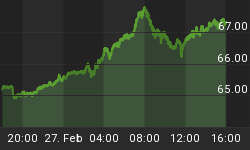The trading week has kicked off on a downbeat note with stock futures markets hammered thanks to a new round of trade hostilities between the U.S. and its trading partners. Dow futures fell more than 150 points after news emerged that the U.S. Treasury Department plans to restrict Chinese ownership of U.S. tech companies. Companies with at least 25 percent Chinese ownership will be blocked from buying U.S. companies with “industrially significant technology”.
The S&P 500 mini futures dropped half a percentage point; Dow Jones Industrial Average futures slipped 165 points, while Nasdaq-100 futures were down 0.8 percent.
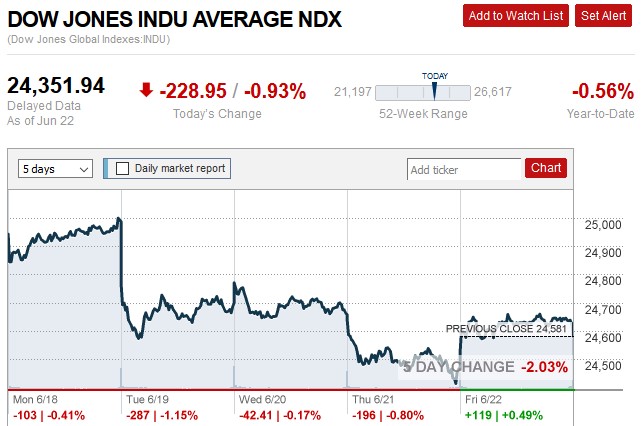
(Click to enlarge)
Source: CNN Money
There are rumors that the ceiling might end up being even lower than that, thus barring many Chinese firms from investing in SU tech companies. Related: How Long Will The Gold Rout Last?
The urbs are designed to frustrate China from moving ahead with its “Made in China 2025” initiative that will catapult the country into global leader status in 10 broad areas of technology, including aerospace, electric vehicles, biotechnology and information technology.
Trade Wars
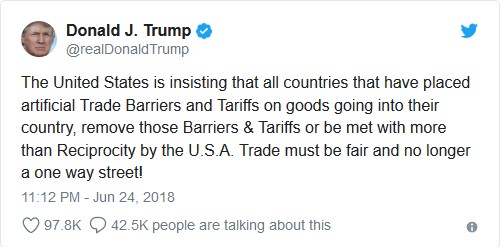
(Click to enlarge)
Last week, the Dow Jones lost more than two percent after president Trump tweeted a threat to impose a 20 percent tariff on all car imports from the European Union unless the bloc removes barriers to U.S. goods.
The EU promised to slap retaliatory tariffs if the U.S. made good on its threat.
Trump’s tweet rippled through financial markets sending shares of Volkswagen, Fiat Chrysler, BMW and Mercedes-maker Daimler lower. Shares of U.S. automakers Ford and General Motors were also caught up in the storm and slipped lower.
Trump’s tweet came just hours after the EU imposed tariffs on America goods worth $3.3 billion in response to the U.S.’ barriers to imported steel and aluminum. EU tariffs target politically resonant products including Levi Strauss jeans, Harley Davidson motorcycles and bourbon.
Trump has railed against unfair tariffs imposed on U.S. goods and has vowed to reduce the trade deficit between the U.S. and her trading partners. America’s trade deficit with the EU on vehicles hovers around $40 billion.
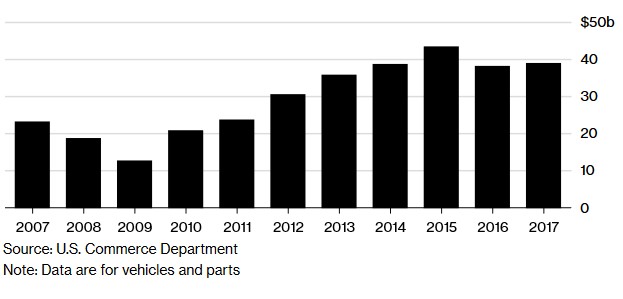
(Click to enlarge)
Source: Bloomberg
Job Losses
Many U.S. lawmakers have been highly critical of Trump’s use of a 1960s-era trade law that gives the president authority to impose import restrictions without first seeking congressional approval. The trade law was rarely used before Trump took office.
Trump’s tariff rhetoric doesn’t do much good to an American auto industry already in its second year of decline.
The EU, for its part, has warned that escalating global trade wars could cost the global economy $300 billion.
But even more dire is the fact that auto levies could lead to heavy job losses.
Related: Trade War Fears Fail To Spook Legendary Investors
The EU has estimated that duties of 25 percent would cut U.S. imports of cars and car parts by half and lead to the loss of at least 180,000 American jobs. The U.S. imported automobiles and cars and car parts worth 294 billion euros last year, with 58 billion euros originating in the EU.
The U.S. is the largest importer of EU cars with cars making up a fifth of the region’s exports
German carmakers would especially be hard hit by escalating trade disputes since the country ships 600,000 autos to the US every year. Even a 20-percent tariff would be enough to wipe off their profits.
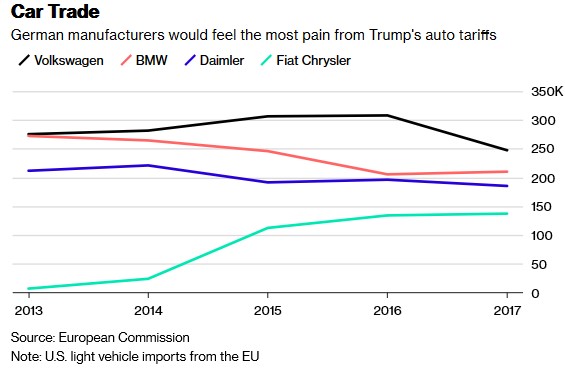
(Click to enlarge)
Source: Bloomberg
By Alex Kimani for Safehaven.com
More Top Reads From Safehaven.com:




